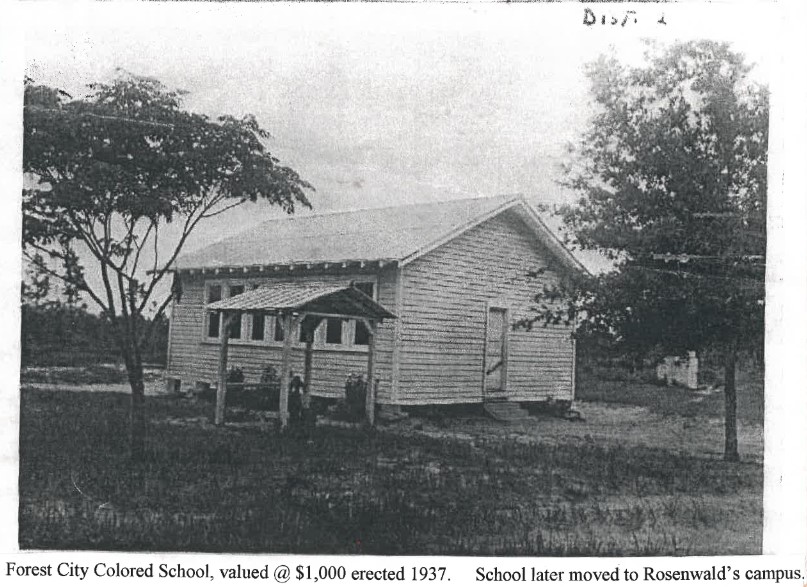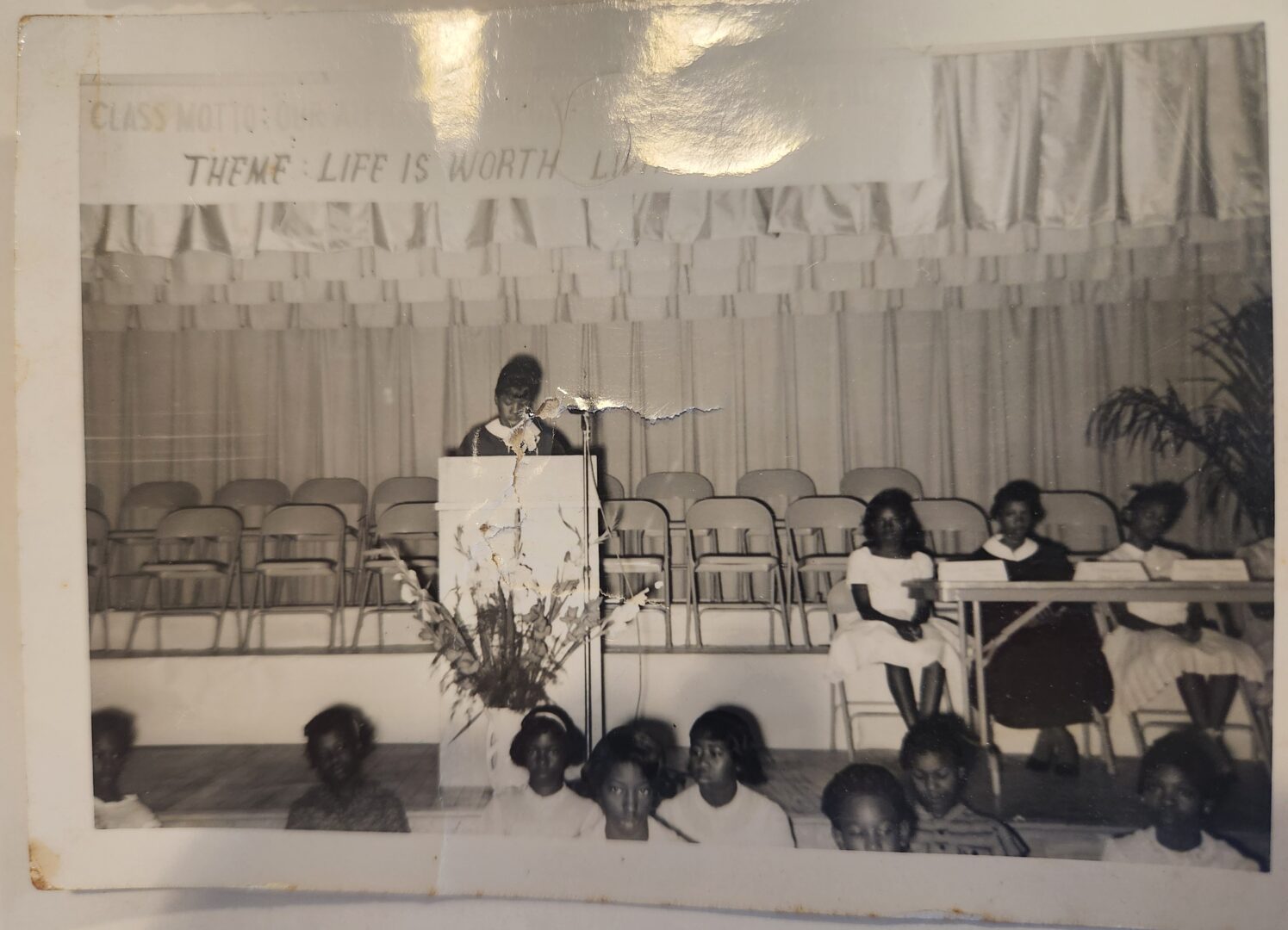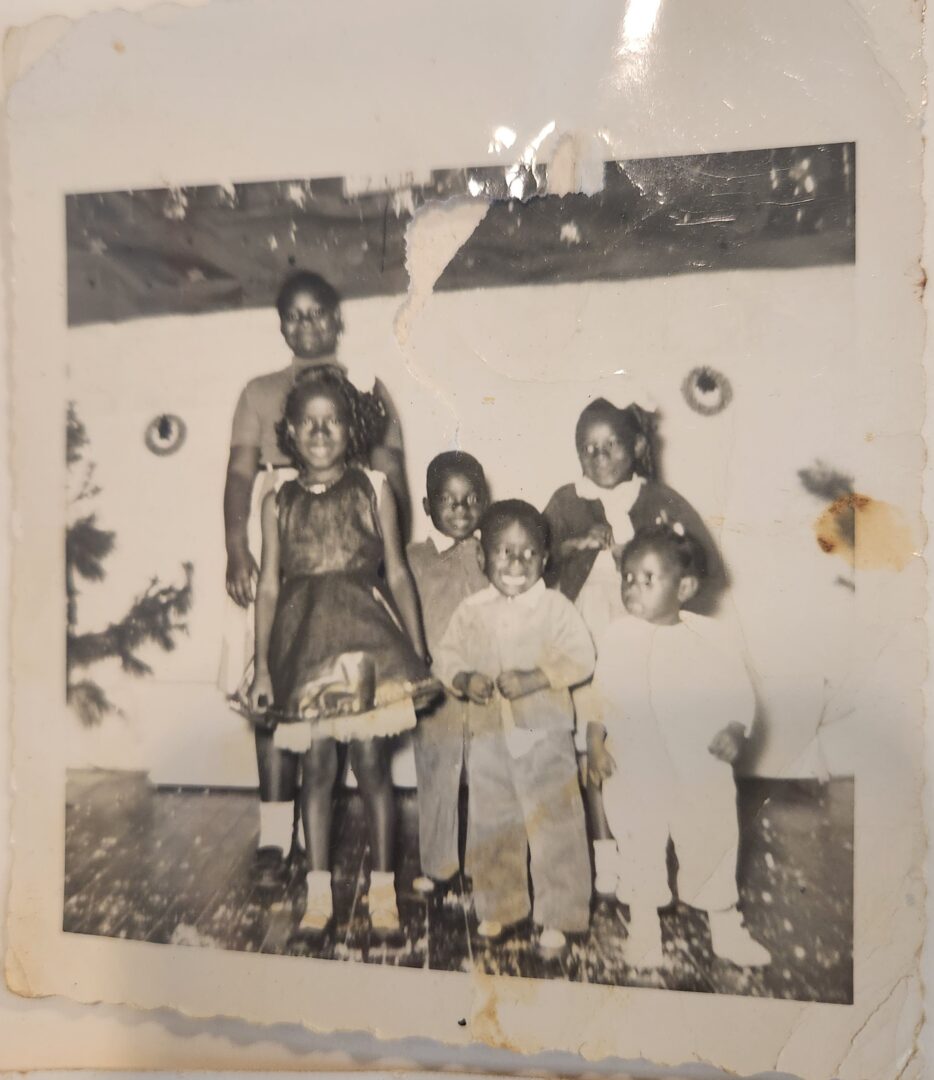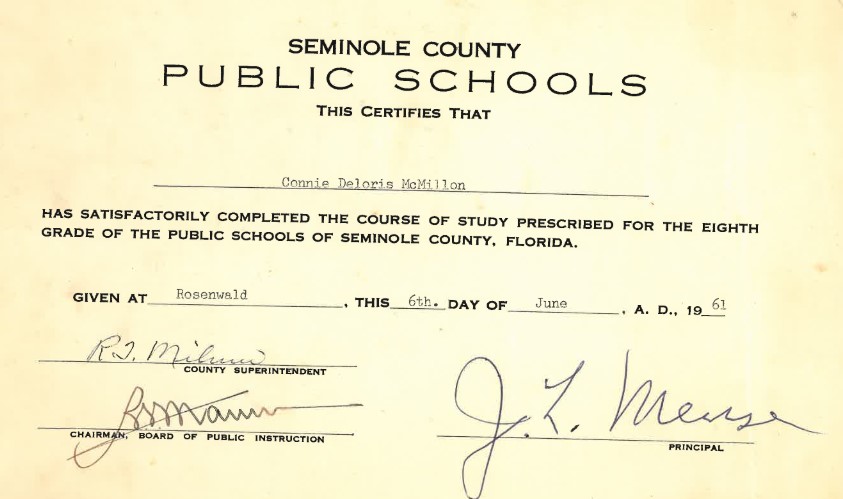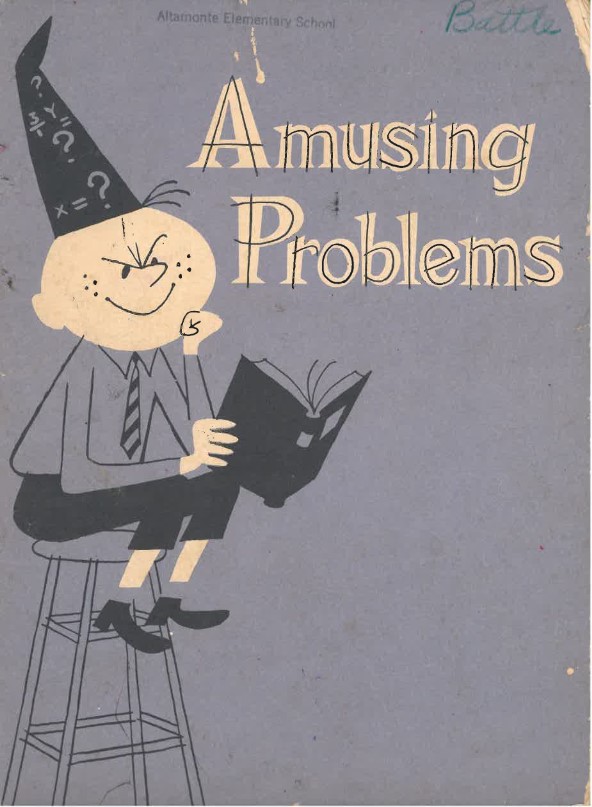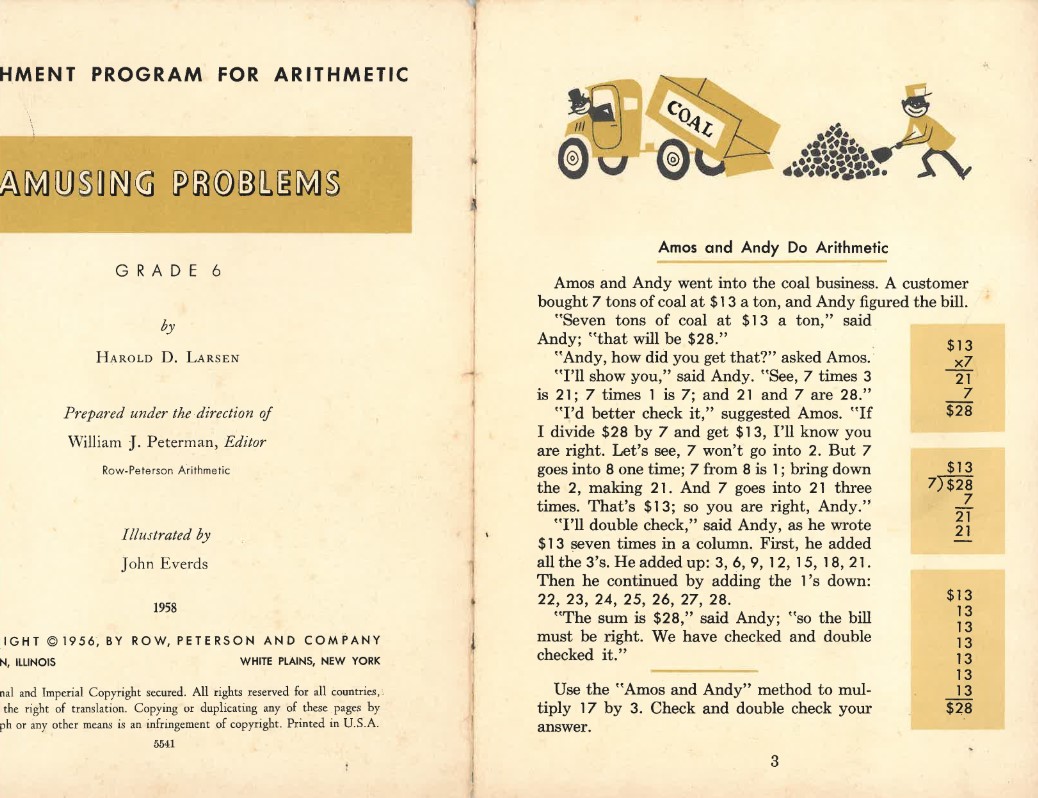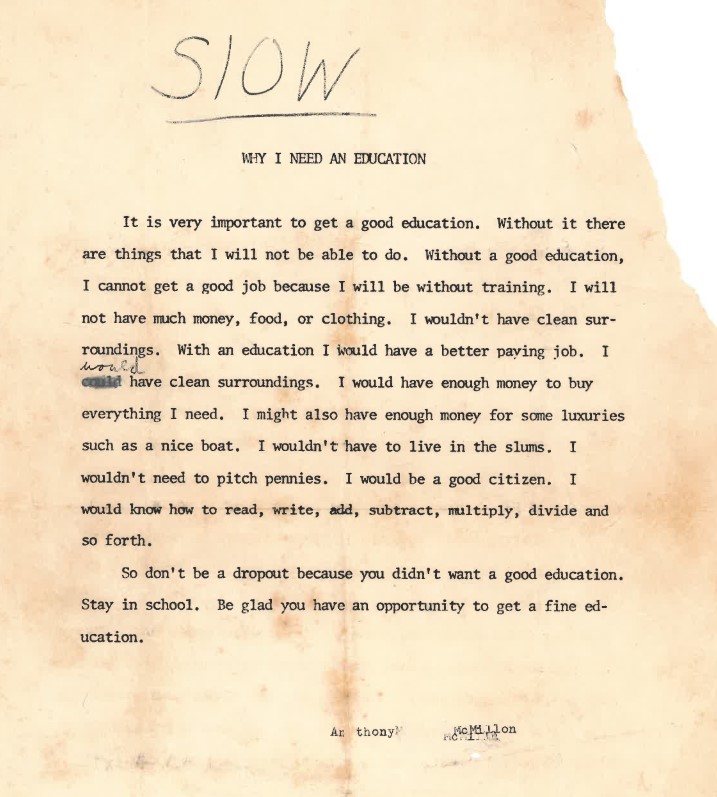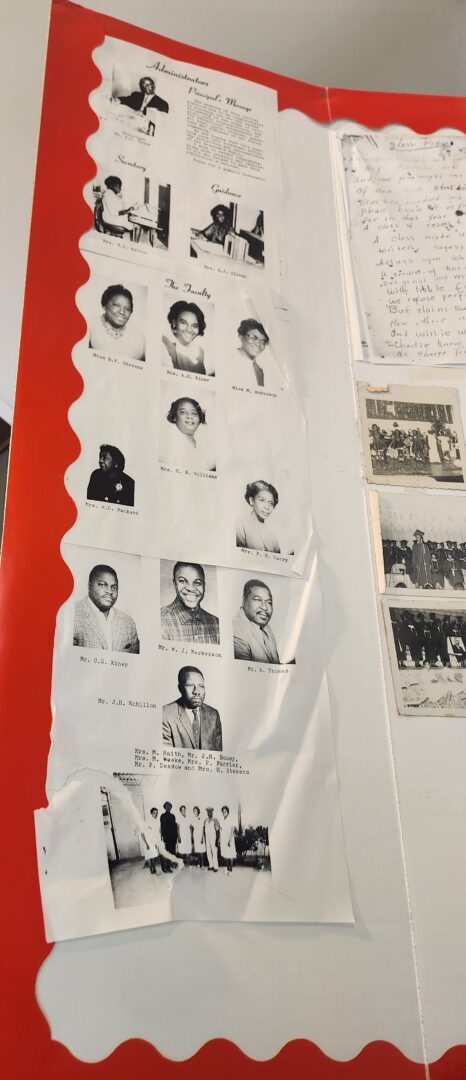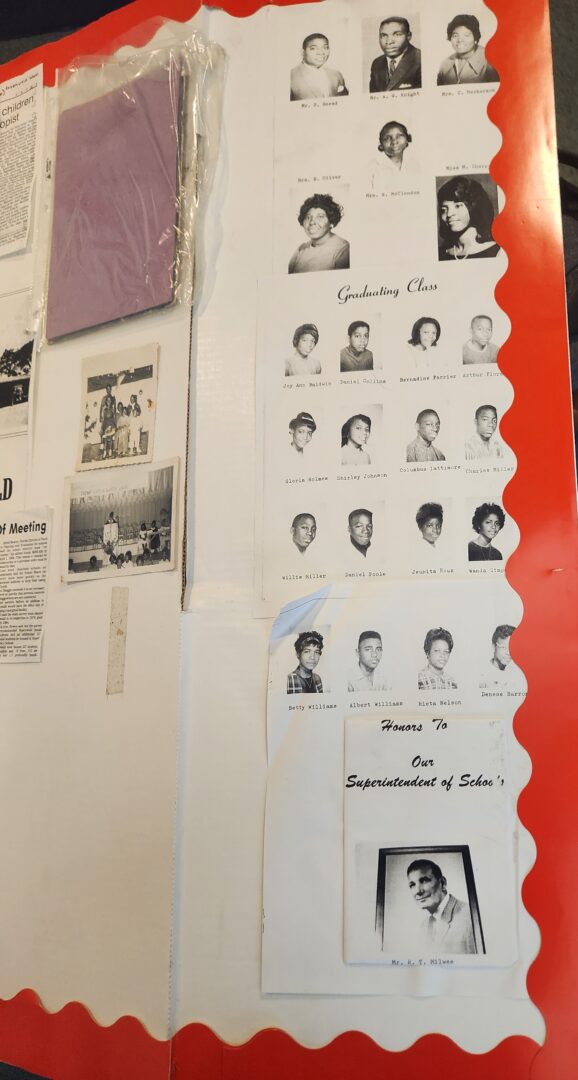Transcript
This interview was conducted on January 12, 2024, at the Casselberry branch of the Seminole County Public Library. The interviewer is Amy Marie Cantley. It is part of an oral history series and a specific effort to collect stories of those who attended Rosenwald School in East Altamonte.
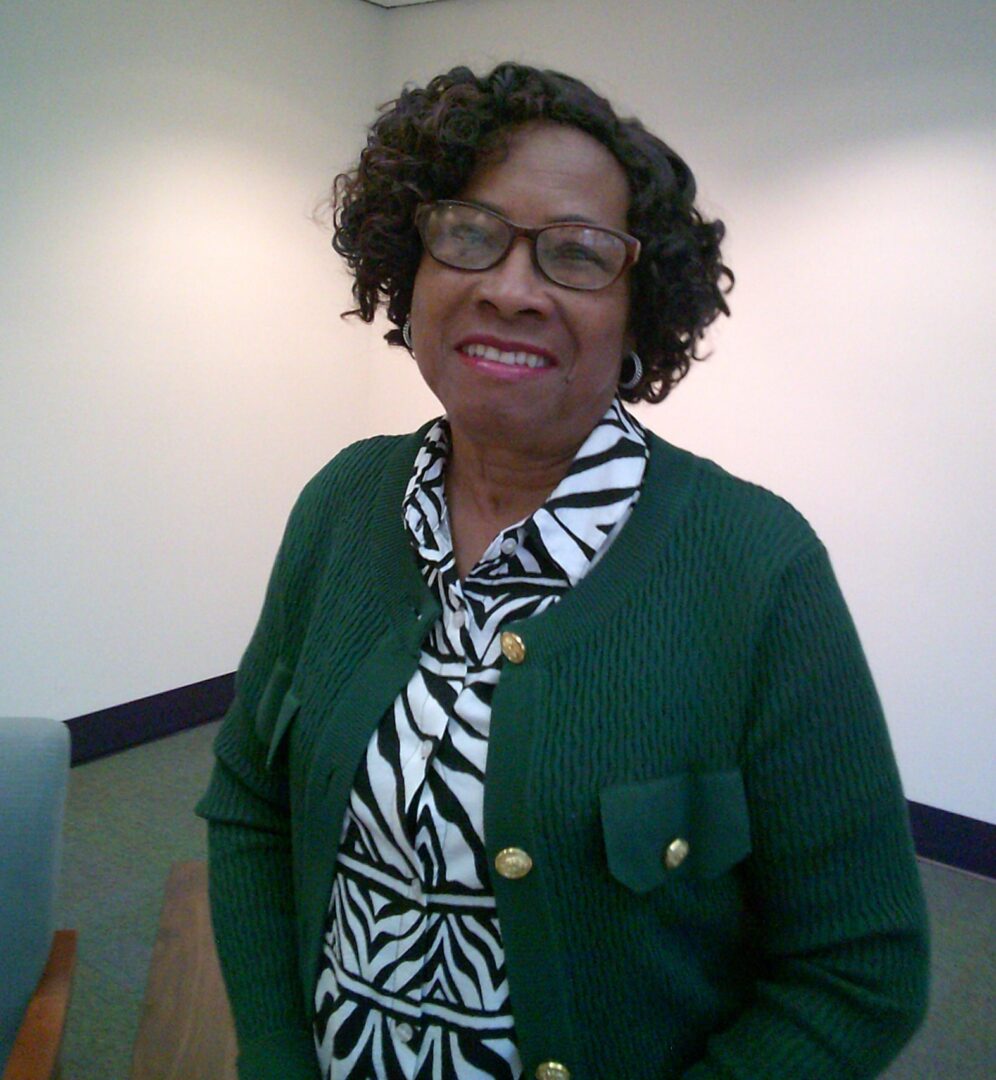
Amy Marie Cantley
This oral history interview recording is being made as part of a collection for the Seminole County Public Library. These interviews capture the stories and experiences of residents in the area, and students and educators from the Rosenwald School located in east Altamonte, Florida. Today is Friday, January 12th, 2024. My name is Amy Marie Cantley and I am interviewing Mrs. Connie McMillon-Thomas at the Central Branch Library in Casselberry, Florida. Mrs. McMillon-Thomas, do I have permission to record this interview and make it publicly accessible on the library website?
Connie McMillon-Thomas
Yes, you may.
Cantley
Do I have permission to share this recording? Any transcripts created from the recording or supplemental materials with other repositories?
McMillon-Thomas
Yes.
Cantley
Thank you very much.
McMillon-Thomas
You’re welcome.
Cantley
First question: when and where were you born?
McMillon-Thomas
I was born in September of 1947 in Melbourne, Florida. I was born in my grandfather’s house. My mother and father at the time were living there. Daddy was finishing school, I believe, and back in the day, that’s what happened. You married and you took the bride home to your parents’ house. So, I was born there.
Cantley
And where did your father – – where was your father attending school at the time?
McMillon-Thomas
Daddy attended school – – I don’t know the name of the high school at the time, but it ended up being Stone High School in Melbourne is where he went to high school and later on he went to Bethune Cookman College in Daytona Beach, Florida.
Cantley
What brought your family to Seminole County?
McMillon-Thomas
In the early 50s, late 40s, Daddy graduated college. And we moved to Seminole County. I think he had employment at that time. So we, we moved to Altamonte Springs. And we’ve been pretty much been here ever since.
Cantley
So they settled in Altamonte and stayed in the area. Do you remember any early community memories from the area?
McMillon-Thomas
Yes. Let’s see, there were the Tillmans. When we first moved over we roomed with them in their rooming house and I remember Ms. Ford. We later rented a house from her. And of course there was Condor Merritt. We lived next door to him. And there was the the Boldens, the Tuckers. Colstons [ph]. Quite a few people. They’re all pretty much like the founding fathers of Altamonte.
Cantley
Any memories about them personally or, or just that they were around in the area?
McMillon-Thomas
Well, living next door to Condor Merritt, who is well known in the history of Altamonte, was quite an adventure. He’s a very pleasant man. His wife also, you can imagine living next door to a house full of children, that that might create problems for some people- but for him, it didn’t. I remember Mr. Gadsen, he was my father’s best friend throughout life. They were lodge[??] brothers. I remember Mr. Bolden. I believe he was a business owner and I think his business was in oranges. That was the major business back in the day.
Cantley
Were there lots of groves in the area at the time?
McMillon-Thomas
There were, there were lots of groves. In fact, the subdivision I live in now Grenada South was an orange grove. But Altamonte was pretty much 50/50 groves, a lot of them. But I think the cold during the 1960s, the hard freeze that came through knocked out a lot of the crops throughout Florida.
Cantley
You mentioned living next door to a bunch of children. How many siblings did you have?
McMillon-Thomas
At the time when we lived on – – it was North Street at the time. But now it’s Merritt Street. There were five of us. We later moved across town on to Dunbar Street, where my mother still resides. And it ended up being a total of nine children.
Cantley
That’s a nice large family there.
McMillon-Thomas
It was a baseball team. [Cantley laughs]
Cantley
So You were growing up and you eventually attended Rosenwald School. What year did you begin your education there?
McMillon-Thomas
I think the year was around 1953, because I graduated in 1961 and entered Hungerford High School in Eatonville.
Cantley
Do you – – what were your early school memories?
McMillon-Thomas
Rosenwald was definitely a place of learning. The discipline was strong, the teachers were definitely dedicated to their profession. They wanted to make sure you understood the lesson plan. There was no such thing as a child that couldn’t learn. They would devise ways for that child to learn. We had peer on peer teaching. The so-called smarter children would help the delayed children to learn, and it was a very effective method of teaching that they employed at the time. It was very good.
Cantley
So in some of the other interviews I’ve heard about multiple grades in one classroom. With that type of setup is was that a way that they were able to set up for the more advanced students, helping the more delayed students?
McMillon-Thomas
I remember the multiple grades when the school burnt down in I believe 1960 – – 59, 60 – – we had too a hold school in the local churches. So that’s – – I remember most of the grades there. In the actual physical classroom itself, I don’t remember that per se, because by then the school had expanded where there were separate classrooms, but in the class itself, the children were separated by rows. You knew who was who by which row you sat in and it was a incentive for you to move up to another row. We didn’t think of the children as dumb, if I may use that term. We just thought of the children as, “oh, they gonna try to outdo me”, so everybody strived to the best of their ability. And when that one child couldn’t move up, then the children that were capable moved over so that person did not feel that they were different. Special education as we know it today was not special education because they they really treated those students as if they could learn and were able to learn. I’m not going to go into how I feel about education today- we would be here all day. But yes, that – – that, that is what I remember about the classroom.
Cantley
Did you have a favorite subject?
McMillon-Thomas
I like math and science. My father taught math and science in – – to me in 7th and 8th grade he was my math and science teacher. He was a history major. I hated history. [McMillon-Thomas laughs] I didn’t let him know, but for some reason math and science was my favorite subjects.
Cantley
So you had your father as a teacher. What was that like, to be instructed by your father?
McMillon-Thomas
In the beginning it was, as the children would say today, weird. But it ended up being OK, because he treated me as a student in the classroom and as a daughter in the home. Some of the children in the classroom, because I excel in those subjects, thought I was getting a free ride, but they didn’t know when we got home from school every day, there was homework waiting for us. From Daddy, not our teachers. We had to read a book every night. He would go over all of our work during the day. His teachings did not stop at 3:00, they continued at home. Because he believed in education for his children.
Cantley
Sounds like he was one of your first teachers then, period. [Cantley laughs]
McMillon-Thomas
Well, yes, he was.
Cantley
How long did he teach at Rosenwald or teach period, for that matter?
McMillon-Thomas
He taught for about – – I believe it was 33 years. He retired because of failing health and eyesight. But it’s 33 years. Not entirely at Rosenwald. During integration, he was transferred to South Seminole Middle School, where he taught the remaining years there. Mhm.
Cantley
Did you have a favorite teacher?
McMillon-Thomas
Not really. I had teachers that influenced me. My second grade teacher Miss Reichert. I’m left-handed and back in the day it was a sin to right with your left hand. But she took time – – I will never, never, never, ever forget – – she took time and taught me how to write with my left hand. And she was the type that instilled in the young ladies to look and dress like young ladies. Don’t come to school looking any kind of way. She would buy ribbon and have a brush. And if the little girls came in and they were unkept because some of their parents were were poverty-stricken. She said, “No, no, no, it doesn’t matter what your financial status is. You need to look your best, always.” So she would make them brush their hair and put a ribbon in their hair. It’s simple things like that that boosted the self-esteem.
And then there was Daddy, of course. Because he would not leave the blackboard until everybody in the class understood the concept. He was that kind of teacher. He would go over and over and over. Repetition, repetition, repetition. Until we all understood. And if he felt like he couldn’t explain it, he would ask one of the students to explain.
He was determined that every kid in his class would exceed. And who else? There was another female teacher, Miss Williams and Miss McClendon. They were ladies. They taught us how to sit, how to dress. How to eat with a knife and fork, other than teaching us English and history. So Rosenwald was similar to a fine European boarding school. We learned social graces, we learned music we learned about – – we learned literature. We learn how to behave in public. Just a lot of things, a lot of things – – how to speak correctly – – a lot.
Cantley
Teaching you how to be in the world.
McMillon-Thomas
In the world, in the world. And when I left Rosenwald and went to Hungerford, I encountered some of the same principles. Mr. and Mrs. Otay, as the children say today, did not play the radio. He was the principal and she was the guidance counselor. And when I left Hungerford and started college, I felt like I was very well prepared for the world.
Cantley
So since you’ve moved on to your high school experience and Hungerford, what were you involved in? Any extracurricular activities or clubs in either of these school environments?
McMillon-Thomas
You know, I was but I can’t remember.
Cantley
OK. [both laugh]
McMillon-Thomas
I wasn’t involved in as many as I would have liked because of transportation at the time, I couldn’t stay after school because my mother transported me back and forth to school every day.
Cantley
And that was driving over to Eatonville, correct? What are some of your memories from high school?
McMillon-Thomas
It was a fun time and I’m still in contact with a lot of the classmates. I have – – even now, after graduation, they seem to have appointed me as class president. If anything comes up, they call me. Connie “such and such”, “What are we gonna do?” I dunno. [McMillon-Thomas laughs] But it was a very close knit graduating class that I was in, 65 students graduated in 1965. And a lot of them have passed away, but we still remain close.
The instructors were similar to the ones at Rosenwald. You were there to get an education. The discipline was orderly. The band was excellent. The football team was excellent. A lot of the band members went on to become band professors at their colleges. One particular class member, Robert Williams, I think he was the and leader at Alabama, A&M. Something like that. Don’t remember. And just recently retired, yes. But it was a school of excellence, that’s what I remember.
Cantley
I’m just stepping back for a moment, to Rosenwald and the East Altamonte community. What would you – – how would you describe the relationship between the school and the community and its place in the community?
McMillon-Thomas
The relationship between the school and the community was very positive. The people of the community would often seek advice from the school as a whole. Rosenwald was the center of activity for the community. Weddings were held there, no funerals, of course. But weddings were held there, receptions – – the school had a lot of activities for the students there. The parents were encouraged and they did participate. So Rosenwald was like the the catalyst that kept the community going at the time.
Cantley
Wonderful. So after you completed high school, you continued your education. Where did you go to school after high school?
McMillon-Thomas
I started over in Lake County at Johnson Junior College back during the 60s. The community colleges were – – most of them weren’t integrated so we had Johnson Community in Leesburg. And we had Lake Sumter in Leesburg. And what they would do in order to ease the process of integration, some of the courses were taught at Johnson and some were taught at Lake Sumter, and eventually Johnson was phased out. And I attended Lake Sumter for a while but then became homesick and transferred back over to Seminole Community College at the time, which is now Seminole State and got my associate degree there and went back and got my nursing degree there. And I’m proud to announce that in April, I will be getting my bachelor’s degree from UCF.
Cantley
That’s wonderful.
McMillon-Thomas
Yes, yes, I’m doing the last class now.
Cantley
That’s so wonderful. So is it also in nursing? Or did you go a different route this time?
McMillon-Thomas
No, I went into what they called interdisciplinary study – –
Cantley
OK.
McMillon-Thomas
Which from – – with that you – –
Cantley
Like a liberal arts degree.
McMillon-Thomas
Right, you can go any place with it. And it was just on my bucket list because my sister has her doctorate. My other sister has her masters. These are my younger siblings that I encouraged to go farther. I was too busy nursing to go back to school and by then raising a family. And I said you know I’m gonna get my bachelor’s.
But I do a lot in the community and a bachelor’s would give me a little bit more just having it giving more credibility. But oddly enough all of my nursing positions were bachelor’s, master’s degree level, and they knew this. But they said we’re gonna grandfather you in because you can do it. [McMillon-Thomas laughs] Well, OK, give me the money. [McMillon-Thomas laughs]
Cantley
Yes. [Cantley laughs] What attracted you to nursing as a career?
McMillon-Thomas
My mother often tells a story that my grandmother told me I should be a nurse. I remember the day she told me that, she said, “Connie, I think you should be a nurse because you have such a kind hand. You seem to care for everything. “My grandmother’s husband, who’s my step-grandfather was a deaf mute. But he had a way with animals and I would always follow behind him. My siblings were afraid, but he had a way with animals. And she saw that and she thought I would make a good nurse because I wasn’t afraid to be with him and his animals. Most of them were wild but they didn’t – – they didn’t bother me. But I have compassion for people. I don’t like to see people suffer. If I could ease their suffering, I will. I did not pursue a master’s in nursing because I didn’t want to be taken away from the bedside. I’m a bedside nurse. I’d like to be there in the middle of the night when my patient is in agony and give them a back rub or change their sheets or get a cool cloth and put across their heads, or – if they allow – sit there and read a passage of scripture to them. That I just felt compelled to be a nurse.
Cantley
And you’ve been a nurse for a long time. Once you started your career, did you stay in the area or did you move away?
McMillon-Thomas
I stayed in the area and and moved away briefly to Jacksonville to take a position with Duval County Health Department. That – – the health department was my goal. It was my goal to work at the health department during the latter years of my career. I wanted to end my career in public health because I remember the public health that would come to Rosenwald and give us our shots and talk to us about puberty, so forth and so on. And she was very kind and very compassionate. I said “I wanna be like you, when I grow up.” [McMillon-Thomas laughs] Yes, I want to give back.
Cantley
So what brought you back to the area?
McMillon-Thomas
A position at Seminole County Health department. And I retired for the second time this year. I retired for the first time in 2016 and the – – we had a Hepatitis A outbreak, so they asked me to come back and. work through that. And I didn’t retire, just stayed on payroll. And they called me back during COVID. And I led the outpatient vaccine campaign along with Alan Harris for Seminole County. And so now that things have settled down, I said OK, it’s time for me to officially, officially retire. [Cantley laughs]
Cantley
As you know, Seminole County government acquired the Rosenwald property several years ago. They conducted many community meetings about the future of the Rosenwald campus. Do you have thoughts about what you would like to see happen with the Rosenwald campus?
McMillon-Thomas
Yes, I do. And I believe another person Ms. Cora has given you those wishes also – – we are on the same page, we helped developed that plan. Basically a Community Center police substation, a place where the seniors can hold their programs. As of now, they’re holding it at Bethel in their church annex and they need a place in their own. Senior housing, health department substation, where they can come in once a week or whatever, and people from the community can go and get their blood pressures, cholesterol, hemoglobin, A1C’s checked. And True Health is also working with the health department and they – – and so they would have a place also to come in and do their primary care screenings for people that don’t have transportation to go to their facility. And I knew it would never be a school again. We have requested that it remained named Rosenwald. So it will be the Rosenwald Center. But those are some of the things I would like to see there.
Cantley
Thank you. So what would you like people to remember about Rosenwald and the community that surrounds it.
McMillon-Thomas
We were once united. Progress is not always progress. We were once united at Rosenwald. It held – – it was the glue that held the community together. It produced a lot of great leaders. Alcee Hastings, as you know, was one of them. We have had doctors, lawyers, nurses, dentists, teachers, a lot of professional people start at Rosenwald and done well. And believe it or not, many of them are finding their way back to the community. To help bring it back together. But the main thing I would like to to say about Rosenwald it was a place of learning. We did not get involved in Republican, Democrat – – all of that stuff. You were given a choice. If you had a question about something you were educated on that something. You were not steered to make a decision one way or the other. That was left up to you.
Cantley
So before we close out, is there anything else that you would like to share about that we haven’t covered yet?
McMillon-Thomas
I think we pretty much covered a lot of – – a lot of information. There was one interesting thing I remember about integration of Rosenwald. And I hate it to this day, but that was the best way it could be done to make the transition as soon as possible. Our best teachers were taken from Rosenwald and transferred to other schools and we did not always get the best teachers down at Rosenwald. That was clearly seen and some of the students suffered for that. And then when the kids came down, it was as if we had all grew up together in the same community forever. Because to the children, it doesn’t matter. It doesn’t matter.
And when the school, the elementary school was being phased out and it was being turned into a school for children with disabilities you could see the “normal children” being very protective of the children with disabilities. It was a good idea to integrate those children into that setting because to me they were normal also, and they needed to be treated as if they were normal. But the children just bonded, just bonded. So the the African American community suffered with the closing of Rosenwald and so did the children who had disabilities suffer with the closing of Rosenwald. It was not a win-win for anybody. I think that’s it.
Cantley
Well, thank you.
McMillon-Thomas
You’re welcome.
Cantley
I appreciate your time. And your story [both speaking] and being so generous with both of them.
McMillon-Thomas
You’re welcome.
Cantley
Thank you.
McMillon-Thomas
The main stuff – – at our first mass class reunion we did a poster board. Listed the principals up until 1975, when the school started to go into transition. History of Rosenwald Schools. I found the history of Rosenwald School in my father’s writings and shared it with the community.
Cantley
OK, nice.
McMillon-Thomas
Up until then, as far as I know, they really weren’t sure how the school got started and the founder – –
Cantley
Mhm, Julius.
McMillon-Thomas
and so forth an so on. The school that was moved to the Rosenwald Campus from Forest City.
Cantley
OK. That one if you don’t mind, I can see your graduating class here.
McMillon-Thomas
This was the graduating class – – no, this isn’t mine. I think you forgot to put the year here. This was my certificate from Rosenwald.
Cantley
Oh, for 8th grade graduation there?
McMillon-Thomas
Mhm, mhm. This was a speech written by my brother. I think he was maybe in 4th grade. He used Daddy’s typewriter about why we needed education. His name is barely – –
Cantley
Anthony McMillan.
McMillon-Thomas
He is now a computer IT tech for the city of DC. [unintelligble] And you notice young ladies, legs crossed at the ankles. That was Rosenwald. We would borrow books from other schools and this is one that we borrowed. A MacBook. Give me that. But I do a lot of – –
end of interview
Supplemental Material
